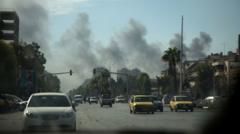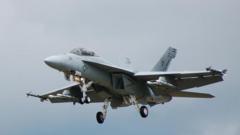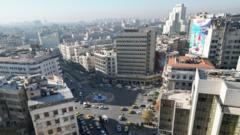Amid the recent overthrow of President Bashar al-Assad's regime, Israel conducted extensive air strikes across Syria, focusing on military installations, while the international community remains on alert regarding the potential existence of chemical weapons.
**Escalating Air Strikes: Israel's Military Actions Across Syria Amidst Regime Change**

**Escalating Air Strikes: Israel's Military Actions Across Syria Amidst Regime Change**
Reports emerge of Israeli air strikes targeting military sites in Syria amidst ongoing geopolitical tensions and a shifting power dynamic.
In a striking escalation of military engagement, Israeli warplanes are reported to have executed over 100 air strikes across various locations in Syria, notably including the capital, Damascus. The UK-based Syrian Observatory for Human Rights (SOHR) confirmed that targets struck included military facilities and a research center believed to be involved in chemical weapon production.
The Israeli government has justified these operations as necessary actions to preemptively curtail weapons from reaching extremists in the region. Following the fall of President Bashar al-Assad's regime, the United Nations Security Council convened to deliberate the emergent security scenario within Syria. Israeli strikes reportedly targeted facilities linked to Iranian military activities and rocket development, amid warnings from the Organization for the Prohibition of Chemical Weapons (OPCW) concerning the potential dangers posed by leftover chemical weapons stockpiles in the country.
Historically, the use of chemical weapons in Syria has been a contentious issue; despite the declared destruction of 1,300 tons of such weapons, reports suggest that new stockpiles may exist. Syria had acceded to the OPCW in 2013 following a devastating chemical attack that resulted in over 1,400 fatalities, yet instances of chemical weapon usage persisted throughout the civil conflict, leading to further scrutiny from international watchdogs.
With the recent turmoil igniting a new chapter in Syria's protracted civil war, rebel forces led by Hayat Tahrir al-Sham declared the capital's liberation, prompting Israeli Prime Minister Benjamin Netanyahu to herald this event as historically significant for the region. This shift in power dynamics places additional attention on Israel's strategic interests in the Golan Heights, a territory it seized from Syria in 1967—a move that remains internationally unrecognized.
Netanyahu emphasized Israel's intent not to interfere in Syria's internal politicking, reaffirming a commitment to protect Israeli citizens from threats. Defense officials vowed to eliminate heavy military assets that could pose risks, illustrating Israel's ongoing defensive posture. The opposition group's ascendancy may influence future Israeli strategies, notably if potential peacemaking opportunities with new Syrian leadership emerge.
Israeli air strikes in Syria have surged since hostilities resumed in Gaza, largely as a reaction to increased cross-border aggressions. Continuous military actions reflect Israel's broader strategic calculus, particularly in a reconfigured Middle Eastern geopolitical landscape vulnerable to shifting alliances and power vacuums following the fall of established regimes. As developments unfold, the international community remains vigilant regarding the ramifications for regional stability and security.
The Israeli government has justified these operations as necessary actions to preemptively curtail weapons from reaching extremists in the region. Following the fall of President Bashar al-Assad's regime, the United Nations Security Council convened to deliberate the emergent security scenario within Syria. Israeli strikes reportedly targeted facilities linked to Iranian military activities and rocket development, amid warnings from the Organization for the Prohibition of Chemical Weapons (OPCW) concerning the potential dangers posed by leftover chemical weapons stockpiles in the country.
Historically, the use of chemical weapons in Syria has been a contentious issue; despite the declared destruction of 1,300 tons of such weapons, reports suggest that new stockpiles may exist. Syria had acceded to the OPCW in 2013 following a devastating chemical attack that resulted in over 1,400 fatalities, yet instances of chemical weapon usage persisted throughout the civil conflict, leading to further scrutiny from international watchdogs.
With the recent turmoil igniting a new chapter in Syria's protracted civil war, rebel forces led by Hayat Tahrir al-Sham declared the capital's liberation, prompting Israeli Prime Minister Benjamin Netanyahu to herald this event as historically significant for the region. This shift in power dynamics places additional attention on Israel's strategic interests in the Golan Heights, a territory it seized from Syria in 1967—a move that remains internationally unrecognized.
Netanyahu emphasized Israel's intent not to interfere in Syria's internal politicking, reaffirming a commitment to protect Israeli citizens from threats. Defense officials vowed to eliminate heavy military assets that could pose risks, illustrating Israel's ongoing defensive posture. The opposition group's ascendancy may influence future Israeli strategies, notably if potential peacemaking opportunities with new Syrian leadership emerge.
Israeli air strikes in Syria have surged since hostilities resumed in Gaza, largely as a reaction to increased cross-border aggressions. Continuous military actions reflect Israel's broader strategic calculus, particularly in a reconfigured Middle Eastern geopolitical landscape vulnerable to shifting alliances and power vacuums following the fall of established regimes. As developments unfold, the international community remains vigilant regarding the ramifications for regional stability and security.





















